NIGERIA: WHEN COURTS GREW FANGS AND THEN DIDN’T
Tinubu, Trump, Nigerian Judiciary, US Judiciary, Election Petitions...
Highlights :
A detailed explanation of why the Nigerian Judiciary refused to dissolve Tinubu’s presidency. No, it is not as simple as Euro-American mainstream media and some alternative media outlets claim.
Brief (tangential) commentary on the attitude of US Judiciary towards election petitions; the 2020 US Presidential Election; 2023 Colorado State Supreme Court ruling and how all of these are viewed in certain Global South countries.
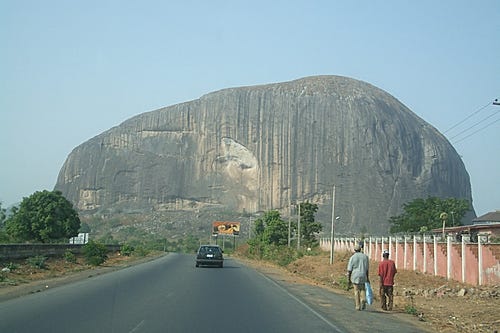
On 26 October 2023, a couple of aides of President Bola Tinubu streamed into Aso Presidential Villa—so named because it is in the close proximity to the 3,071-feet (936-metre) tall Aso Rock, one of two monoliths that adorn the skyline of the capital city of Abuja.
The aides had dropped by the Presidential Office within the villa to congratulate their boss, Bola Ahmed Tinubu, on his decisive victory over the legal challenge mounted by his two rivals in the Presidential Election held in February 2023.
As you will soon see in a short video, which I have taken the liberty of subtitling, the aides—mostly civilians— obsequiously praise Tinubu for winning the approval of the Nigerian Supreme Court to continue his role as President of the federation of thirty-six states.
Tinubu smiles mischievously at his civilian aides, and at his military orderly, Lieutenant-Colonel Nurudeen Yusuf, who flashes a salute, and for some unfathomable reason, declares his civilian boss a “five-star general”.
President Tinubu recognizes the cringeworthy sycophancy and humorously tells them, “your jobs are all secure”.
In February 2023, Nigeria held general elections, which encompassed balloting for the national presidency; the bicameral federal legislature; some state governorships; all thirty-six unicameral state legislatures; and certain municipal office positions.
The general elections of February 2023 represented the seventh time that Nigerians had gone to the polls since the chaotic military dictatorship era (1966-1979 and 1983-1999) effectively crumbled with the nationally celebrated death of the extremely cruel military ruler General Sani Abacha on 8 June 1998.
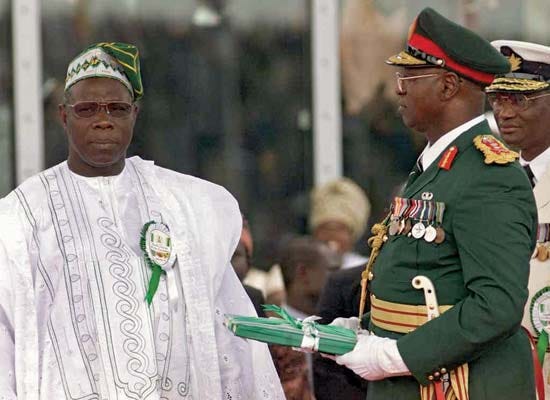
Restoration of Nigeria’s proper federal system and elected public officials on 29 May 1999 did not cure the country of all its ills, especially corruption. But it ended the regressive El Caudillo Era when convoys of bullion vans brazenly and crudely hauled neatly stacked heaps of crisp dollar bundles from the Central Bank to the private residence of some psychopathic military imperator who ruled by decree, without a legislature, and in defiance of the national constitution.
Nobody misses the era when newspapers and magazines were banned by successive military juntas for exposing official kleptomania and brave local journalists were incarcerated or murdered in drive-by shootings or blown up with parcel bombs; the lawless years when stubborn federal judges got bombs placed under their cars for reaching wrong verdicts; or the period in which university students and labour union workers protested and got raked with submachine gunfire on city streets; or the hanging of environmental activists who had exposed crude oil pollution in the petroleum-rich Niger Delta.
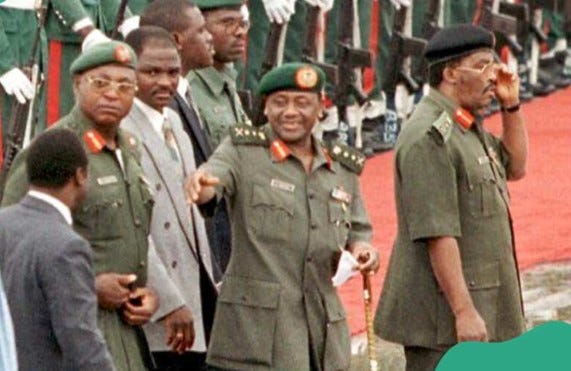
Nevertheless, we must confront the fact that the initial enthusiasm that followed the end of the military dictatorship era has waned and this can easily be measured by the progressively declining participation of voters in federal elections. For the 2023 presidential and federal legislative elections, there were 93.47 million registered voters, but only 24.9 million persons attended polling stations to cast paper ballots. In other words, a meagre 26.7 percent voter turnout.
In the relatively freer and fairer 2015 federal elections, the voter turnout was 43.7 percent. In other words, 29.43 million persons went to the polling stations out of 67.42 million registered voters.
After the federally-run electoral commission declared former Governor of Lagos State, Mr. Bola Ahmed Tinubu, the “duly elected President of Nigeria” following the 2023 Presidential election, his two miffed challengers for the office of the presidency promptly filled their court notices to contest the electoral result.
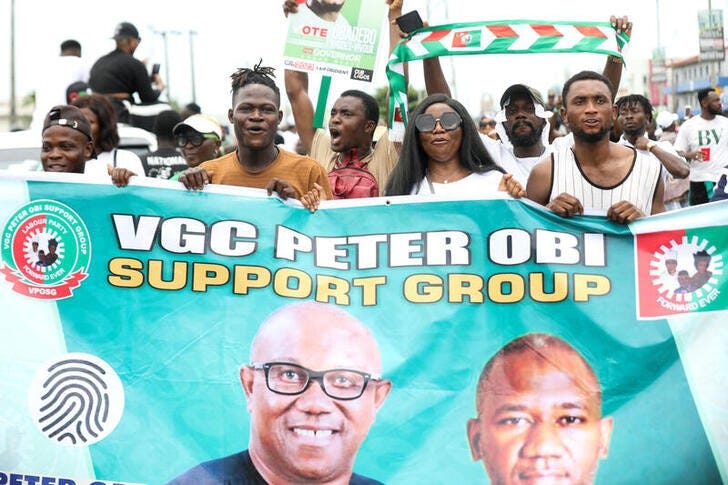
One of the court plaintiffs was Mr. Peter Obi, the former governor of my home state (i.e. Anambra State) in Southeastern Nigeria, who ran as the third-party presidential challenger and received a lot of support from young educated professionals all over the country, regardless of ethnicity. Although, their overall impact on the election has not been adequately measured.
The other court plaintiff was Mr. Abubakar Atiku, former Vice-President of Nigeria, who ran as the presidential candidate of Peoples Democratic Party (PDP), the pro-establishment party that controlled the federal government from 1999 until it was ousted in the 2015 general elections by its pro-establishment rival, the All Progressives Congress (APC).
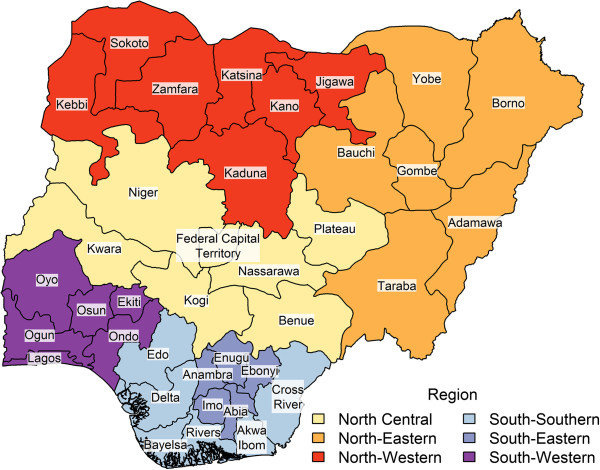
SIDE BAR: SHOOTING DOWN THE PUPPET MYTHOLOGY
US State Department officials famously backed Peter Obi, which led some clueless alternative media outlets to conclude that he was some kind of “puppet” when in reality, the Americans were only being opportunistic because they thought he would be declared winner of the elections based on polls conducted by New York Times and Washington Post.
Yes, the Americans (and many young Nigerians) were disappointed when Peter Obi did not ascend to the Federal Presidency, but there was never a chance that an American-controlled Colour Revolution would ever take place in Nigeria as feverishly predicted by certain alt-media sites in the immediate aftermath of the presidential election.
I explained at length why no revolution would happen in this article and that article. As I predicted, the Americans swallowed their threats of sanctions and grudgingly congratulated Tinubu and even sent a nine-person delegation the Presidential Inauguration Ceremony on 29 May 2023.
Tinubu himself did not forget how the Americans had treated him before and immediately after the general elections. Contrary to the nonsensical claims of him being “a puppet” in alt-media, Tinubu would steadfastly resist all attempts by US Secretary of State Tony Blinken to circumvent well-laid out ECOWAS protocols for military intervention, which was faithfully followed in previous situations (e.g. 2016—2017 Gambian Constitutional Crisis).
And when it became clear that his staunch supporters in Northern Nigeria were stridently opposed to intervention in Niger, President Tinubu rejected further talk of military action despite several visits from French and US emissaries, and a face-to-face meeting with Joe Biden on the sidelines of the G-20 Summit in New Delhi, India.
Over the years, Nigerian courts have shown themselves to be quite capable of siding with underdog candidates from smaller parties against powerful pro-establishment party candidates by cancelling several electoral victories at federal, state and municipal levels on grounds of terrible fraud.
My favourite case is the legal battle over the disputed governorship election that took place on 14 April 2007 in Ondo State. At the end of that flawed balloting exercise, the electoral commission had declared Segun Agagu the candidate of the pro-establishment Peoples Democratic Party (PDP) as the “duly elected state governor”.
The third-party candidate in that governorship election, a medical doctor named Segun Mimiko, vehemently disagreed with the election results and headed to the law courts.
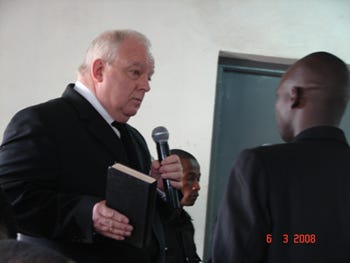
In the course of the initial legal proceedings, which ran from May 2007 to July 2008, the panel of judges at the ad hoc Ondo State Gubernatorial Election Petition Court ordered recalcitrant officials of the electoral commission to release the electoral register as requested by the plaintiff, Dr. Segun Mimiko.
Upon close examination of the electoral register, it was found to contain numerous fictitious local names assigned to real passport pictures of randomly selected individuals. A certain number of the photographs accompanying the false names had been electronically scanned from calendars, almanacs, newspapers and record albums.
Hilariously, some of these made-up names were listed against random pictures of underage teenagers, toddlers, deceased individuals, and well-known Nigerian figures such as Justice Idris Kutigi (then Chief Justice of Nigeria) and Dr. Charles Soludo (then Head of Central Bank of Nigeria)
Foreigners were not left out of the farce. The scanned pictures of famous Brits and Americans, such as David Beckham, Mike Tyson, Muhammad Ali and Michael Jackson, were also assigned to fictitious local names listed in the electoral register as eligible voters for the 2007 Ondo State Governorship Election. Yes, I kid you not.
Having seen evidence of perfidy, the presiding judges at the ad hoc court promptly took a surgical scalpel to the total number of ballots counted for the gubernatorial election. They nullified elections conducted in districts of the state where the overwhelming number of fictitious voters were listed as residents. All ballots emanating from those “tainted” districts were excluded.
The remaining ballots from “untainted” districts of the state were then tallied up, resulting in the third-party governorship candidate winning more votes than the establishment PDP candidate who had already spent one year as the incumbent governor of the state in question.
The Ondo State Gubernatorial Election Petition Court consequentially ruled in July 2008 that Dr. Segun Mimiko was the truly elected state governor not the incumbent, Mr. Segun Agagu. The latter promptly appealed the ruling.
In February 2009, the Federal Court of Appeals upheld the ruling of the ad hoc court and the humiliated sitting state governor, Mr. Agagu, was forced to vacate his position for the victorious third-party candidate, Dr. Mimiko.
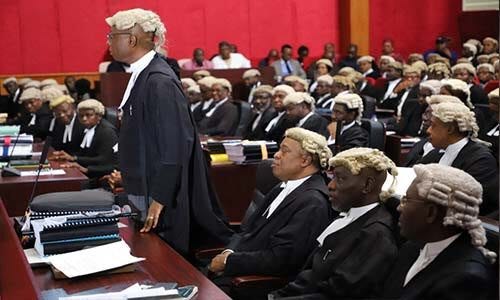
Around the same time, the ad hoc court in Ondo State was ruling in favour of Dr. Segun Mimiko, several state and federal legislative electoral results all over the country were being annulled by judges on grounds of widespread vote-rigging that occurred on 14 April 2007.
The precedent for all of these can be traced back to the landmark court ruling of March 2006 in Southeast Nigeria in which judges of the Federal Court of Appeals declared Peter Obi, then a struggling third-party gubernatorial candidate, the rightful winner of the 2003 Anambra State Governorship Election. As a result of this court ruling, Dr. Chris Ngige—the sitting Anambra State governor (belonging to PDP)— was ousted three years into his 4-year tenure to make way for Peter Obi to take power.
As I chronicled in this linked article, during his first term in office (2006-2010) as Anambra State Governor, Peter Obi was removed from office multiple times by his powerful PDP enemies— sometimes, with the active connivance of the electoral commission. But each time, the Nigerian federal judiciary intervened to restore him back to power.
So it was totally understandable that several years later, Peter Obi believed that he had a decent shot at convincing Nigeria’s federal judiciary to nullify the results of the 2023 Presidential Election dogged by serious allegations of voting irregularities.
After all, over the years, Nigerian judges have courageously nullified dozens upon dozens of fraudulent election results at federal and state levels to the chagrin of establishment power brokers, especially those associated with Peoples Democratic Party (PDP), the previous ruling political party.
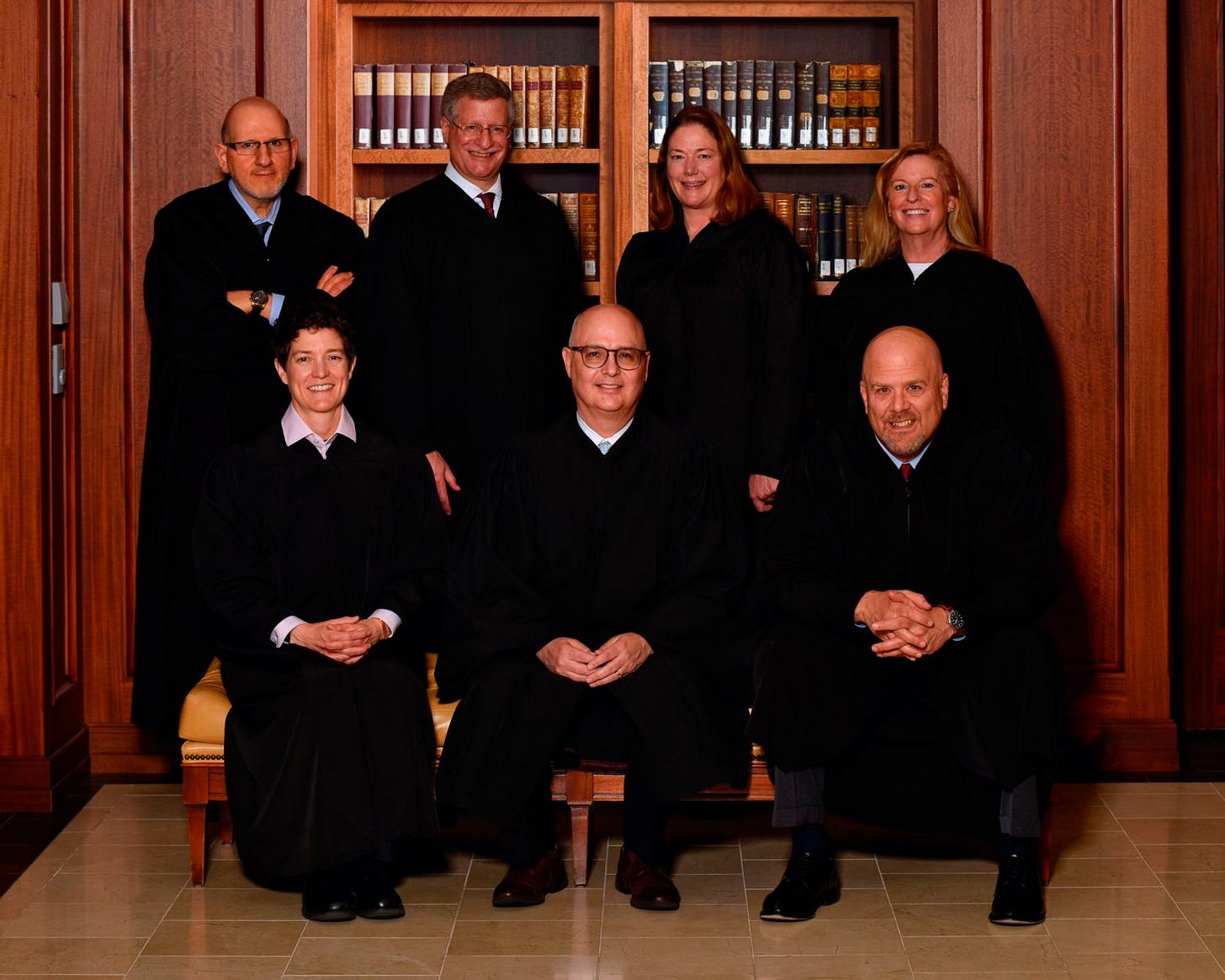
I would even irritate some of my American readers by arguing that Nigerian judges have often exercised far more courage than many US judges who employ various kinds of legal tricks and an assortment of technicalities to dismiss electoral petitions put before them by third-party candidates (and even some mainstream party candidates) over the years.
I know this to be true because I occasionally download and read verdicts published on the official websites of certain state judiciaries in the USA. Every technical excuse under the sun has been used to dismiss the petitions—including those supported with large numbers of sworn affidavits.
The commonest excuses for dismissing election petitions in USA on technical grounds are “lack of standing” and “laches”. This was particularly egregious in the aftermath of the controversial 2020 US presidential election.
Yes, it was controversial. And so are ongoing attempts by unscrupulous judges across USA to exclude Donald Trump from participating in the 2024 Presidential Elections using bogus felony charges.
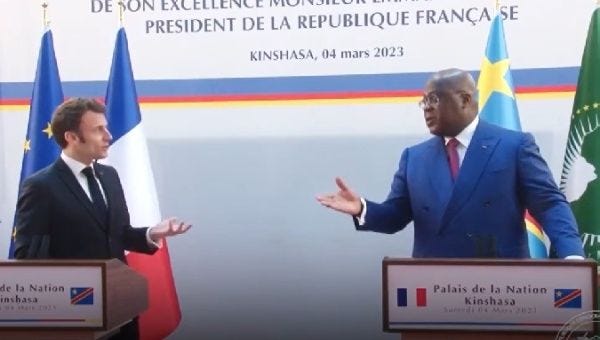
Despite the non-stop propaganda from Euro-American corporate mainstream media outlets, a decent number of people living in the Global South still noticed.
President Félix Tshisekedi of Democratic Republic of Congo mentioned the controversial 2020 US presidential election in a speech he delivered during French President Emmanuel Macron’s visit to his country in March 2023.
The left-leaning President Andrés Manuel López Obrador of Mexico—not a fan of Trump— also mentioned it too. Later on, he expressed his surprise at the shoddy treatment of the embattled former US President by the American judiciary.
The right-leaning President Nayib Bukele of El Salvador weighed in as well by repeating almost exactly what President Félix Tshisekedi of Democratic Republic of Congo had said several months ago about “American democracy”.
The difference was that Tshisekedi made the remark in reaction to the controversial 2020 US Presidential Election while Bukele was reacting to the recent decision of the Colorado State Supreme Court to exclude Trump from the Republican primaries aimed at choosing a candidate for the upcoming 2024 US Presidential Election:
Having said all of the above, I would say the much vaunted courage of the Nigerian judiciary does have its limits. Asking Nigerian judges to nullify the election of legislators and state governors is one matter, but it is a totally different proposition to ask them to venture into uncharted territory by overturning a presidential election. That path is filled with significant risks, including the potential for a constitutional crisis and civil unrest.
As I have already intimated, Nigeria’s general elections of April 2007 were probably the worst in the history of the country. Industrial scale ballot fraud committed all over the country kept judges in both federal and state courts very busy cancelling election results that had largely favoured politicians of the then ruling Peoples Democratic Party.

By July 2008, judges had dismissed 10 incumbent state governors from their positions on grounds of ballot fraud committed during the gubernatorial elections of 14 April 2007.
Court verdicts annulling the election of incumbent governors— although necessary— have proven to be highly disruptive to the affected states of the federation. This disruption can be attributed to the protracted nature of judicial battles, which often involve frequent suspensions (i.e. “stays”) of court verdicts while appeals to higher-ranking courts are pursued. Multiple appeals—some of which eventually reach the Supreme Court—can sometimes take a few years to conclude, by which time the embattled incumbent governor may have already served two or three years of their four-year-tenures.
I have already given the example of Dr. Chris Ngige, the sitting Anambra State governor, who was dismissed by an appellate court in the third year of his four-year tenure after a lengthy legal battle that ran from April 2003 to March 2006.
Due to the verdict of the Supreme Court, the pre-existing Anambra State Government was abruptly dissolved, causing some chaos as several construction projects commissioned by Ngige’s cabinet officials to build new public infrastructure or refurbish old ones had to be put on hold to give Peter Obi a chance to constitute a new state government.

A sizeable number of Nigerian federal judges are simply not ready for the disruptive consequences of dismissing an incumbent national President from office on the basis of electoral fraud. Beyond that, there is the fear of civil unrest.
Presidential office is a very sensitive position in many countries, especially in multinational federations such as Nigeria with various competing ethnic nationalities that speak mutually unintelligible languages and follow different cultural traditions and religions.
As a matter of fact, it doesn’t really matter if the incumbent President had actually “won” the election that catapulted him to power. The millions of people that support him —especially those who share his ethnicity—are likely to be outraged by any court annulment of his apparent “election victory” and may take to the streets to protest the ouster of their preferred President.
And if things get out of hand, those protests can easily evolve into a second civil war that would make the first civil war (1967-1970) fought between the secessionist Republic of Biafra and the Nigerian Military Junta appear like child’s play.
Many federal judges in Nigeria would rather dance barefoot on a floor littered with shards of broken glass than render any electoral verdicts that might provoke widespread civil unrest in the country.
Now, let’s briefly examine the 19-month-long court battle that took place to overturn the 2007 Presidential Election. The legal dispute involved then incumbent President Umaru Musa Yar’Adua and his election challengers, retired General Muhammadu Buhari and former Vice-President Atiku Abubakar, both perennial presidential candidates.
SIDE BAR : PERENNIAL CANDIDATES FOR PRESIDENTIAL OFFICE
Muhammadu Buhari—a former military ruler (1983-1985)— ran unsuccessfully as a civilian politician for presidential office three times, in 2003, 2007 and 2011 before finally succeeding in his fourth attempt in 2015.
Atiku Abubakar sought presidential office six times, in 1993, 2007, 2011, 2015, 2019, and 2023. In most cases, his ambition was stymied by his failure to secure nomination as the presidential candidate of his political party.
For that reason, Abubakar repeatedly changed his party affiliation. Failure to secure nomination as presidential candidate of a political party was usually his cue to defect to another party willing to give him the platform to contest in the presidential elections.
Hilariously, he abandoned and returned to PDP twice. He decamped from the pro-establishment party when he failed to secure its nomination as presidential candidate. After unsuccessful stints in smaller opposition parties, he rejoined PDP after party bigwigs promised to help him clinch the nomination. He eventually garnered enough support within the party to become PDP presidential candidate in 2019, and again in 2023.
Back in April 2007, Buhari was just another bereft opposition candidate appealing to federal judges to annul election results that brought the now deceased Umaru Yar’Adua to the Federal Presidency.
The separate legal teams representing Buhari and Abubakar had assembled a decent amount of physical evidence to demonstrate that the 2007 Presidential Election was marred by ballot stuffing and other election irregularities. Nevertheless, the judges in the Federal Court of Appeal used an assortment of legal technicalities as an excuse to dismiss the election petition. Undaunted, Buhari and Abubakar appealed to the Nigerian Supreme Court, which agreed to review the election petition and issue a verdict.
On Friday, 12 December 2008, the Supreme Court issued a split judgment with four out of the seven judges refusing to overturn the election results that brought President Umaru Yar’Adua to power.
The four Supreme Court judges were candid in their acknowledgement of ballot stuffing in the 2007 Presidential Election, but chose not to annul it due to “insufficient” evidence of widespread electoral fraud and the potential civil unrest it could cause. Three Supreme Court judges issued a courageous dissenting minority opinion.
Despite losing the election case, lawyers for Atiku Abubakar were consoled by the fact that Justice Nikki Tobi— who read the nuanced majority opinion on behalf of the four judges— had blasted the electoral commission and politicians of the ruling PDP for their shoddy conduct during the general elections of April 2007.

Sixteen years later, the Supreme Court had a much easier time dismissing the poor quality petitions for the nullification of the controversial 2023 Presidential Election brought by former Governor Peter Obi and former Vice-President Atiku Abubakar.
The legal teams assembled by Peter Obi and Atiku Abubakar headed for the federal courts without a proper strategy. Instead of narrowly focusing on proving that electoral irregularities merited the annulment of the 2023 Presidential Election, they tried to sit on two chairs at the same time.
Both legal teams argued that Bola Tinubu should be dismissed from the Federal Presidency because of fraudulent election results. At the same time, they argued for a retroactive disqualification of Tinubu from running for presidential office on grounds that he allegedly falsified his educational qualifications and was involved in drug trafficking.
![Judges begin inaugural sitting at Nigeria's Presidential Election Petition. [PHOTO CREDIT: Twitter handle of the Court of Appeal | @NGCourtofAppeal] Judges begin inaugural sitting at Nigeria's Presidential Election Petition. [PHOTO CREDIT: Twitter handle of the Court of Appeal | @NGCourtofAppeal]](https://substackcdn.com/image/fetch/$s_!Zsx_!,w_1456,c_limit,f_auto,q_auto:good,fl_progressive:steep/https%3A%2F%2Fsubstack-post-media.s3.amazonaws.com%2Fpublic%2Fimages%2F80029a53-29e2-40a9-9821-8c0056df4ec7_1140x570.jpeg)
Now, let us shift our focus away from legal proceedings and instead explore the allegations of drug trafficking and false educational qualification levelled against Bola Tinubu.
In 1999, shortly after Tinubu assumed office as the governor of Lagos State, a scandal emerged regarding his stated educational credentials. He asserted that he had pursued studies in Economics at University of Chicago (UChi).
A long investigation conducted by Nigerian journalists between 1999 and the early 2000s showed that he had actually attended the less prestigious Chicago State University (CSU) where he studied Accounting.
During that period, there was a significant outcry demanding Governor Tinubu’s resignation for providing false information about the university he had attended.
Private individuals initiated lawsuits regarding that matter, but ultimately, all of those cases were dismissed by state courts.
Within a few years, the whole event had blown over. Tinubu went on to serve two terms as state governor from 1999 to 2007. Throughout his eight years in the governor’s office, he was dogged by various corruption allegations, but the educational qualifications matter was barely revisited. It became a settled fact for most Nigerians (but not all) that he had really attended CSU and lied about being a graduate of UChi.
Fast-forwarding to June 2022, Tinubu is nominated as presidential candidate for the pro-establishment All Progressives Congress (APC) that he co-founded in 2013 to rival the much older pro-establishment Peoples Democratic Party (PDP).
As the February 2023 general elections approached, all manners of wild allegations about the notoriously corrupt Tinubu started to pour into the grapevine of social media outlets such as Facebook and Twitter. Soon enough, those allegations were picked up and echoed in the bigger Nigerian print and electronic media outlets.
The educational qualifications controversy revived, but this time the claim was that Tinubu did not even attend CSU at all. Even though, two decades earlier, the Nigerian media had confirmed from CSU authorities that he had indeed studied Accounting in their institution.
The newly revived educational qualifications palaver and the drug trafficking allegation were brought to the notice of alternative media audiences in Europe and North America by independent journalist David Hundeyin who viscerally hates Tinubu and supports Obi for the presidency.
Personally, I supported my former state governor, Peter Obi, in his run for presidential office and was disappointed that he is not our national leader. However, I have no hatred for Tinubu.
Contrary to non-stop demonization spread by fellow supporters of Peter Obi, there is nothing devilishly unique about Tinubu’s venality. Mr. Bola Tinubu is just your run-of-the-mill establishment politician heavily steeped in corruption. He is not a demon that recently escaped from the fiery bowels of hell. He has neither two heads nor a pair of red horns.
Before, during and after the 2023 Presidential Election, journalists and anti-Tinubu partisans repeatedly contacted CSU authorities for comment. The authorities of CSU reiterated again and again that Tinubu had studied at their institution, but diehard supporters of both Peter Obi and Atiku Abubakar refused to accept the CSU confirmation. These anti-Tinubu partisans began to look for minor discrepancies in original and reissued duplicate educational certificates to support their cause.
SIDE BAR: CHANGES IN CERTIFICATE FORMAT IS NOT PROOF OF FORGERY
The British universities that I attended for my BEng (Hons), Masters and PhD in Engineering have all changed over the years.
A few years ago, one university merged with another tertiary institution and changed its name and emblem.
If I were to lose all my original certificates and ask the universities that I attended for replacement copies, the appearance of my newly reissued certificates would be different compared to the original certificates due to profound changes in format, logo and design.
Given the above explanation, it is stupid and ignorant to cite the duplicate certificate issued by CSU to Tinubu in 1997 as evidence of forgery simply because it doesn’t have an identical appearance to the original certificate issued in 1979.
Because of minor differences in the appearance of the original certificate conferred to Tinubu in 1979 and the duplicate copy reissued to him in 1997, there have been malevolent attempts to impugn the integrity of CSU authorities. Absurd claims have been made that CSU is covering up for Tinubu’s alleged misdeeds.
At this juncture, I would like to reiterate that, during the early 2000s, CSU confirmed that Tinubu attended their institution and that was mostly an accepted fact in Nigeria for two decades prior to the madness of 2022/2023 election season.
Here is a montage of headlines from local Nigerian media about the issue since September 2023:
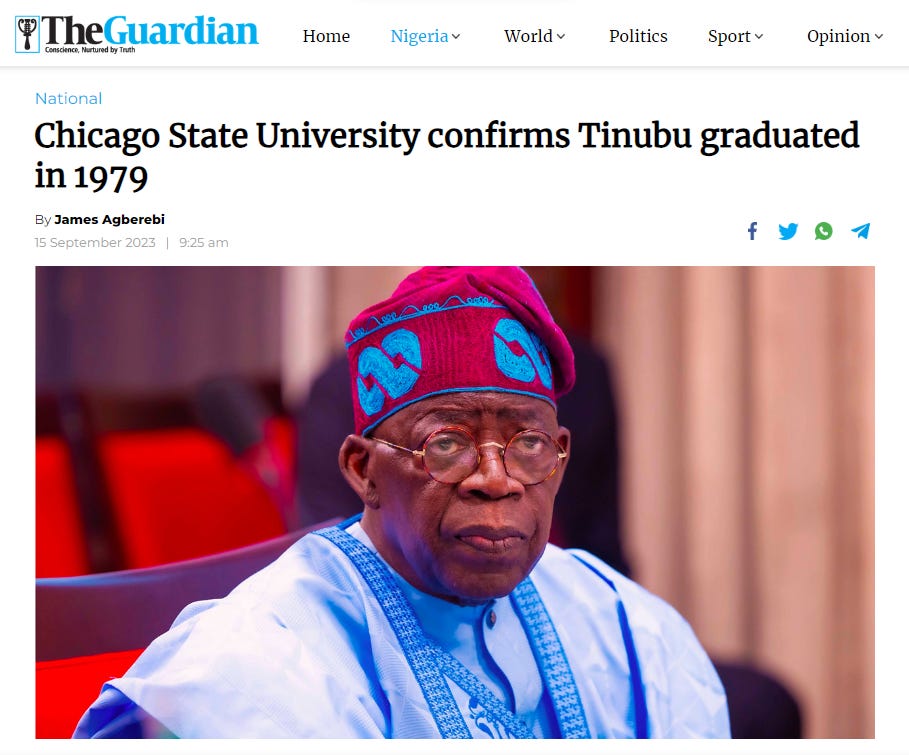



Even the foreign-owned BBC News Pidgin, which was sympathetic to third-party candidate, Peter Obi, had to admit, after an extensive investigation, that Tinubu’s reissued certificate from CSU authorities was genuine:

With over 200 million citizens, petroleum-rich Nigeria is the most populous country in Africa and holds significant military and economic influence in the West African subregion. Therefore, it comes as no surprise that the general elections in this multiethnic nation garnered the attention of numerous foreign countries, both within and outside the continent. One key distinction being that USA refused to exercise discretion while monitoring events inside Nigeria, unlike the BRICS nations, for example.
The Chinese, Russians and others often observe events far outside their jurisdictions with quiet interest and take notes for analytical purposes. The Americans and West Europeans generally barrel headlong into the affairs of far-flung nations and begin to openly interfere.
Mesmerized by Peter Obi’s soft-spoken affability and his lack of corruption, the American media began to openly lionize him. They marvelled at his ability to reach many voters through social media, thus compensating for his lack of the vast political machines and financial resources available to the establishment PDP and APC.
Shortly after favourable polls published by New York Times and Washington Post, the US State Department began to favour Peter Obi.
Tony Blinken and his State Department subordinates could have kept quiet if they wanted. After all, there was nothing at stake for the USA in the general elections. All the main presidential candidates on the ballot were as pro-Western as most of the Nigerian populace. Any of them as President of Nigeria would inevitably seek excellent relations with USA and UK.
But then, it isn’t in the character of the Masters of The Universe running United States to stay out of any other country’s affairs. Blinken had to demonstrate to Nigerian youths tired of corrupt establishment politicians that “USA was on their side”. Blinken had to demonstrate this by supporting Peter Obi, the favoured candidate of most young Nigerian voters.
In their thinly disguised endorsement of Peter Obi, the Americans incurred the quiet anger of Tinubu’s presidential campaign.
Many young supporters of Peter Obi were thrilled that USA was backing their favoured candidate and a hopeful rumour spread all over the country that US government and its Federal Bureau of Investigation (FBI) knew that Tinubu was a drug trafficker. Hearsay had it that US government would use its possession of “documentary evidence” to force Tinubu to abandon his ambition to run for president of Nigeria.
I was an Obi supporter myself, but not one to be pulled into the realm of legends, fantasies and delusions. Bola Tinubu may be a man without any scruples, but there is no real evidence of his involvement in drug trafficking. I say this in spite of reams upon reams of text published by his detractors who hate him with a passion that I find frightening and irrational.
Strong rumours that the Americans would blackmail him into dropping out of presidential race proved to be unfounded. Election day arrived, and Tinubu’s name was still on the ballot paper. In fact, the former Lagos State Governor and his wife smiled for the flashing cameras as they cast their votes publicly in a polling station teeming with his supporters.
That should have ended delusional talk of the Americans applying “compromising FBI evidence” to force Tinubu out of the race. But, no, the rumour refused to die among many young supporters of Peter Obi.
When the electoral commission declared Tinubu the “duly elected President”, many supporters of Obi hung their hopes on American displeasure with the announced results and threats of sanctions against Nigerian election officials and stalwarts of Tinubu’s political party.
Rumours that FBI would soon step out of the shadows with proof of Tinubu’s drug dealing offenses continued to make the rounds until the Americans ended their brinksmanship and grudgingly congratulated Tinubu on his “election victory” after the man was seen in the company of the Chinese Ambassador to Nigeria.
My guess is that the Americans realized that it was worthless to continue alienating Tinubu who could not be stopped from ascending to the Federal Presidency. Moreover, the Americans knew that Tinubu had a history of working with the Chinese, going back to his days as a state governor, as noted in this old article. There was simply no value in pushing Tinubu totally into the pro-Chinese camp.
Instead of narrowly concentrating on persuading the courts to overturn Tinubu’s “election victory” on the basis of voting irregularities, the separate legal teams of Peter Obi and Atiku Abubakar tried to additionally seek retroactive disqualification of Tinubu from running for presidential office on unfounded grounds of drug trafficking and certificate forgery.
There were also conflicting arguments between the legal teams. Abubakar’s legal team sought a court declaration affirming their client as the “duly elected president” in the event of Tinubu’s retroactive disqualification. This request was based on the disputed election results, which indicated that Abubakar secured the second-highest number of presidential votes.
On the other hand, Peter Obi’s legal team sought a declaration that Tinubu should never have been allowed to participate in the presidential election. They called for the cancellation of said election and the organisation of a new one, with Tinubu prohibited from participating.
Both legal teams successfully convinced the Federal Court of Appeals to examine Tinubu’s educational qualifications and admit documents purporting to show that Tinubu had been fined 460,000 dollars by a US court for a civil case allegedly involving drug trafficking and money laundering.
Atiku Abubakar got the US District Court for the Northern District of Illinois to order Chicago State University (CSU) to release Tinubu’s full academic records.
CSU provided a copy of the duplicate certificate issued to Tinubu in 1997 along with samples of certificates conferred to CSU graduates in 1979. Atiku Abubakar’s lawyers had obtained these documents to compare them. Since Tinubu had misplaced his original 1979 certificate, it was not accessible for the comparison.
Both legal teams for Obi and Abubakar informed the Nigerian Federal Court of Appeals about the discrepancies between the reissued 1997 certificate and the samples from 1979. However, the court chose to believe the explanation provided by CSU authorities, that the differences in format and design between the 1997 certificate and the 1979 samples were neither abnormal nor unusual.
On the night of 6 September 2023, the bench of the Federal Court of Appeal, consisting of four male judges and one female judge, delivered a unanimous verdict. They dismissed the allegation of certificate forgery on grounds that it lacked merit.
Regarding the drug trafficking case, the five judges noted that Tinubu had not faced prosecution or sentencing in an American court for any criminal activity. The judges clarified that the civil forfeiture proceedings in the USA were directed towards 460,000 dollars held in Tinubu's bank, rather than being an action specifically targeting Tinubu as an individual.
The judges also reminded the plaintiffs (i.e. Obi and Abubakar) of a publicly available 20-year-old letter that was written by the Nigerian Inspector-General of Police to the American Embassy in 2003. The letter requested information on any criminal convictions that Tinubu—then a state governor—may have incurred in the United States. The American Embassy replied that there were no records of any criminal conviction against Governor Bola Tinubu in USA.
With that explanation, Federal Appeals Court dismissed the allegation of narcotic trafficking levelled against Tinubu.
Once, the frivolous part of the muddled election petition seeking retroactive disqualification of Tinubu had been dismissed, the five judges felt freer to apply technicalities as an excuse to dismiss the serious part of the petition that had to do with actual election irregularities.
The plaintiffs claimed in court that the electoral commission had deliberately stopped automatic electronic transmission of election results to its website, thereby denying Nigerian voters real-time access to the information. The plaintiffs asserted that the commission had disregarded its own rules on electronic transmission in order to manually fiddle with the election results.
The electoral commission denied the allegation, stating that “technological glitches” caused the electronic transmission system to collapse.
The Court of Appeal did not wade into the controversy of whether or not the electronic transmission system was deliberately sabotaged by its owner. The judges simply invoked legal technicalities to assert that the electoral commission had the authority to abrogate its own rules on automatic electronic transmission of election results. The court stated that nothing in written law prevented the commission from switching abruptly to a manual method of transmitting election results, if it so desired.
I want my readers to understand that the manual transmission method has no credibility among the voting public of Nigeria. This is because the manual method inevitably leads to significant delays in the publication of election results. This has led many Nigerians to correctly suspect that the purpose of those delays is to gain time to manipulate the election results. Electronic transmission of results in real time enjoys higher trust among the voting public.
Beyond their ruling on method of transmitting election results, the judges also stated that Obi and Abubakar failed to provide the identities and precise locations of polling stations where the offence of vote inflation had occurred. They also mentioned that the plaintiffs failed to state the exact number of unlawful votes credited to Tinubu by the electoral commission.
In my own opinion, the judges were technically correct when they declared the plaintiffs— Obi and Abubakar— incapable of producing tangible evidence beyond vague assertions.
But then, tangible evidence was not easily accessible to the plaintiffs because of the uncooperative attitude of the electoral commission, which had custody of the voting materials crucial for proving election irregularities.
To its credit, the appellate court ordered scanned images of the ballot papers and other relevant digital voting data to be provided to Obi and Abubakar, but the reluctant electoral commission did everything it could to frustrate proper implementation of the court order. The Federal Court of Appeal failed to follow up with an intervention to ensure that the electoral commission cooperated fully with the plaintiffs.
Without a robust court-enforced cooperation of the electoral commission, the plaintiffs could not gain full access to physical and digital data needed to substantiate claims that voting irregularities were sufficiently widespread to justify the cancellation of the presidential election.
That state of affairs made it easy for the five judges to dismiss what remained of both election petitions on grounds that they were filled with “allegations that were vague, imprecise, nebulous and bereft of particular materials.”
Here is a brief video reporting the unanimous verdict of judges at the Federal Court of Appeals (also known as the “Presidential Election Petitions Court” when dealing with presidential election disputes):
As expected, the dissatisfied plaintiffs, promptly appealed to the Supreme Court to overturn the verdict of the Federal Court of Appeals.
The petitions submitted to the Supreme Court were as shambolic as the ones originally put before the Court of Appeals. Once again, both plaintiffs doubled down on their failed scatter-gun approach. They simultaneously sought to invalidate the presidential election results and retroactively disqualify Tinubu on grounds of narcotic peddling and falsification of academic achievements.
Abubakar’s legal team claimed that it had “new evidence” that indicated that Tinubu was indeed guilty of certificate forgery. The Supreme Court refused to admit the alleged “evidence” and did not waste much time in dismissing both muddled petitions as “frivolous” and “vexatious”. The Supreme Court bench of seven judges ruled unanimously to uphold the judgement of the lower court, and Tinubu kept his job as President of the Nigerian Federation.
The unanimity of the ruling (7-0) delivered by Supreme Court judges on the 2023 Presidential Election is in sharp contrast to the split ruling (4-3) delivered by the same court on the 2007 Presidential Election. Why is that?
Well, the difference lies in strategy. The plaintiffs (Buhari and Abubakar) disputing the 2007 election results independently collected evidence of ballot stuffing and submitted it to the Supreme Court. The compelling nature of the evidence split the judges. The four judges, nervous about the potential repercussions of removing an incumbent President, decided to uphold the flawed election results. The remaining three judges dissented based on the principle that flawed election results should not be allowed to stand.
In 2023, the plaintiffs (Obi and Abubakar) submitted petitions of very poor quality, filled with unsubstantiated claims of drug dealing and certificate forgery. That made it very easy for all seven judges of Supreme Court to dismiss the election petition without any dissent.
Having said all of that, we must not overlook the fact that even with petitions of higher quality, Obi and Abubakar would still have faced the daunting challenge of persuading apprehensive Supreme Court judges to overcome their fear of civil unrest and make courageous rulings based on the merits of well-produced petitions.
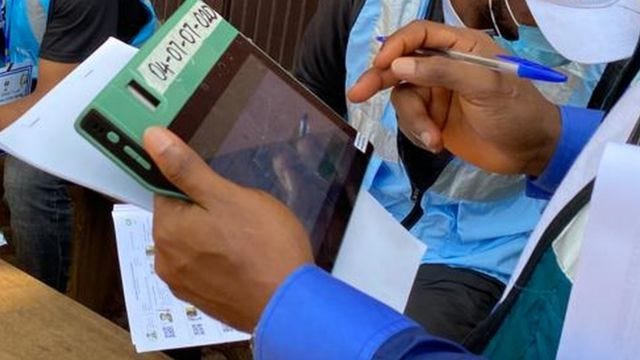
I do think that supporters of Peter Obi should start looking ahead to the future 2027 Presidential Election. That would require a campaign for changes to the composition of the electoral commission and the method used to select its officials.
The concept of utilizing facial recognition and biometric systems to identify individual voters and prevent multiple voting, along with the technology enabling real-time transmission of election results after paper ballots have been hand-counted in each polling station, appeared to be brilliant in theory.
In practice, tech glitches and clumsy handling of unfamiliar new electronic equipment played a role in undermining 2023 general election because once the technology failed, election officials reverted to the manual method of transmission, which caused significant delays and created opportunities for manipulation of election results.

In addition to demanding reform of the electoral commission, followers of Peter Obi would have to insist on a robust training scheme for election officials to enable them better handle sophisticated technology. There should also be backup systems in case the main gadgetry for the elections unexpectedly develop problems.
Party agents should also know how these gadgets work so that they can detect when corrupt electoral officials are trying to fake the breakdown of election equipment in order to revert to the untrustworthy manual method of transmitting election results.
All said and done, I take consolation from the fact that the 2023 Presidential Election was not characterized by petty ethnic chauvinisms of the past. Young people across Nigeria, regardless of ethnicity, supported Peter Obi and were heartbroken that he was not declared the winner. For once, the youths did not polarize along ethnic lines.
For what it is worth, I’m quite pleased that David Hundeyin— an ethnic Yoruba from Southwest Nigeria— has been extremely passionate in his support for the ethnic Igbo politician Peter Obi from the Southeast. He could have backed Bola Tinubu who shares his ethnicity, but he chose not to. That indicates to me that our large multiethnic country is maturing, that many voters are beginning to prioritize “bread and butter” issues over the ethno-religious identities of contestants in national elections.
THE END
***HAPPY NEW YEAR TO ALL MY READERS***
Dear reader, if you like my work and feel like making a small donation, then kindly make for my Digital Tip Jar at Buy Me A Coffee

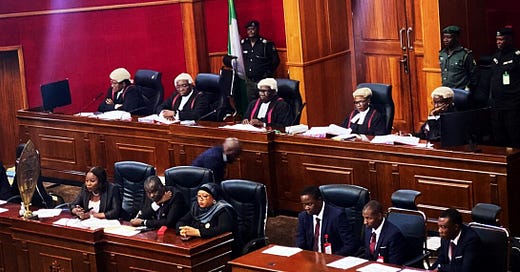






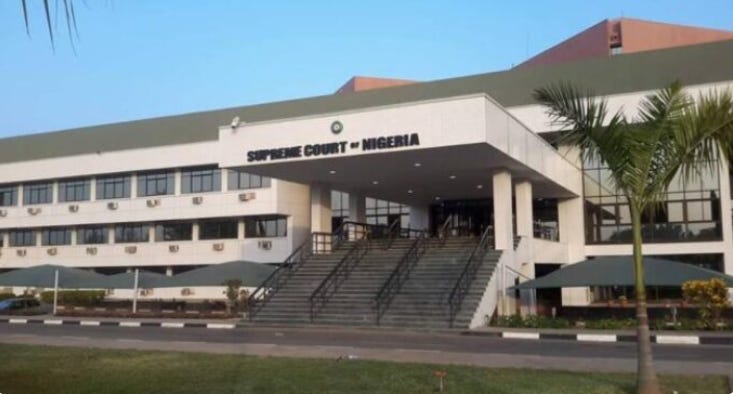



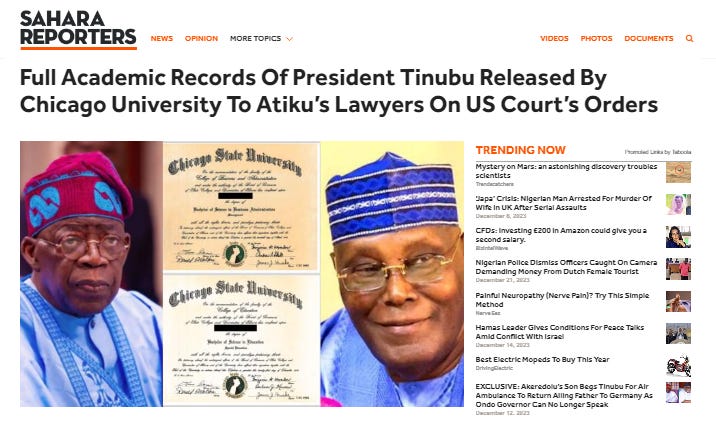

Wow, this is really an in-depth article, thanks very much, a very interesting read.
And a Happy New 2024 Year!
Many thanks for a really interesting article. Happy new year to you!